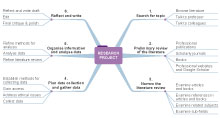2 The researcher as an outsider or an insider
The researcher’s perspective is not only related to philosophical questions of subjectivity and objectivity but also to the researcher’s position with respect to the subject researched. This is particularly relevant for work-based projects where researchers are looking at their own organisation, group or community. In relation to the researcher’s position, s/he can be an insider or an outsider. Here the term ‘insider’ will include the semi-insider position, and the term ‘outsider’ will include the semi-outsider position. If you belong to the group you want to study, you become an ‘insider-researcher’. For example, if you want to conduct your research project with HR managers and you are a HR manager yourself you will have a common language and a common understanding of the issues associated with doing the same job. While, on one hand, the insider perspective allows special sensitivity, empathy and understanding of the matters, which may not be so clear to an outsider, it may also lead to greater bias or to a research direction that is more important to the researcher. On the other hand, an outsider-researcher would be more detached, less personal, but also less well-informed.
Rabe (2003) suggests that once outsider and insider perspectives in research are examined, three concepts can lead to a better understanding. First, the outsider and insider can be understood by considering the concept of power: there is power involved in the relationship between the researcher and the people and organisations participating in the research. As researchers are gathering data from the research participants, they have the power to represent those participants in any way they choose. The research participants have less power, although they can choose what to say to the researchers. This has different implications for insiders and outsiders. It is obvious that in the case of work-based projects conducted in your organisation, the ways in which you choose to represent your colleagues and your organisation places you in a position of power.
Second, insider and outsider perspectives can be understood in the context of knowledge: the insider has inside knowledge that the outsider does not have. If you conduct research in your organisation, institution or profession you will have access to inside knowledge that an outsider will not be able to gain.
The third way in which the insider/outsider concept can be understood is by considering the role of the researcher in the field of anthropology. In fact, anthropologists approach those being studied (e.g. remote cultures, tribes, social groups) as outsiders. As researchers experience the life of those studied by living with them, they acquire an insider’s perspective. The goal is to obtain both insider and outsider knowledge and to maintain the appropriate detachment. This approach applies to participatory research in general, not only anthropology.
Figure 1 reports the various stages you are expected to follow in order to complete and write up your research report.

